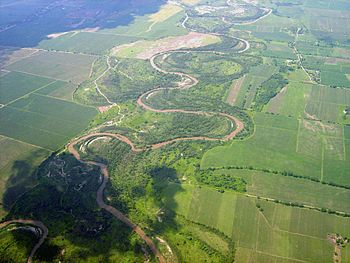Dulce River (Argentina) facts for kids
Quick facts for kids Dulce River |
|
|---|---|

Río Dulce ("Sweet River")
|
|
| Country | Argentina |
| Official name: Bañados del Río Dulce y Laguna de Mar Chiquita | |
| Designated: | 28 May 2002 |
| Reference #: | 1176 |
The Dulce River is a very important river in Argentina. It flows through the province of Santiago del Estero. In Spanish, its name is Río Dulce, which means "Sweet River". In the Quechua language, it is called Misky Mayu.
Contents
Where the Dulce River Flows
The Dulce River starts in Tucumán Province. There, it is known as the Salí River. It also gets water from smaller rivers in Salta Province. When it reaches Santiago del Estero, its name changes to Dulce River.
The river flows for about 450 kilometers (280 miles). It travels southeast through Santiago del Estero. Then, it joins the Río Hondo in Córdoba Province. Finally, it empties into a large salt lake called Mar Chiquita.
Dams and Water Use
There is a dam called the Río Hondo Dam. It is located where Tucumán Province meets Santiago del Estero. This dam creates a large lake. The lake is formed by four rivers from Tucumán.
The Dulce River is super important for farming. It provides water for irrigation in the dry areas of Santiago del Estero. Farmers use its water to grow crops.
The Los Quiroga Dam was finished in 1956. It is in the northwest part of the province. This dam also helps provide water for farming. However, it has caused less rain in the southeastern part of the province.
Protecting the River Environment
The Dulce River flows through a special area called the Argentine Espinal ecoregion. This area has unique plants and animals.
Sadly, the lake created by the Río Hondo Dam has faced some pollution. This happens because some factories release dirty water into the Salí River. People are working to control these emissions. The goal is to keep the river clean and healthy for everyone.
Images for kids
See also
 In Spanish: Río Dulce (Argentina) para niños
In Spanish: Río Dulce (Argentina) para niños
 | Ernest Everett Just |
 | Mary Jackson |
 | Emmett Chappelle |
 | Marie Maynard Daly |


